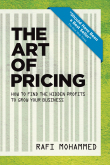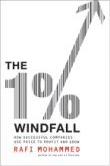A Crash Course in Inflation
A CNBC correspondent recently phoned to discuss pricing strategy and its effects on inflation. Our discussion led me to want to better understand exactly why inflation is so bad for our economy and whether the pricing tactics that many of us (as pricing strategists) implement contribute to inflation.
Inflation is defined as a general price increase of essential products and services that consumers purchase. The key reason why inflation harms an economy is straightforward: a dollar today will be worth less (in terms of purchasing power) a year from now. So if inflation is 10%, a $1 quart of milk today will be $1.10 next year.
A key consequence of high inflation is its effects on interest rates. As an investor, if you expect a dollar is going to be worth 10% less in a year, you’ll need at least a 10% interest rate just to “stay even.” But of course, you want to be more than “even,” so you’ll need an interest rate greater than 10% as an incentive to invest. Thus, the rate of inflation sets an interest rate floor. In 1979, for example, inflation was 13.3% which resulted in a prime rate of 20%. Today inflation is 4.1% and the prime rate is 5.25%
The problem with high interest rates is they stifle the economy. High interest rates make it more expensive for consumers to borrow (e.g., buy high ticket items) and businesses to expand (e.g., new factories). This shrinks expenditures, which harms the economy.
So the link is: higher inflation = higher interest rates = dampened economy. For example, high inflation in the late 70’s/early 80’s led to an unemployment rate of 10.8%. Unemployment is a gauge of the economy and a rate under 5% is considered “good.” Today’s unemployment rate is 4.8%.
Edmund Phelps won the economics Nobel Prize in 2006 for understanding that the real problem with inflation is what people expect it will be next year. If they expect high inflation, investors will demand higher interest rates and companies boost their prices. Thus, the fear of inflation can result in a self fulfilled prophecy of higher inflation.
Thus, temporary price increases are less harmful than price increases that are expected to continue. This is why the Fed is less concerned about inflation today – it doesn’t expect the increase in food and oil prices to perpetually continue in the future.
So…if our work as pricing strategists results in a price increase, will this cause inflation and dampen the economy? Relax… price increases only negatively affect the economy if your product is essential (milk is, an iPhone isn’t) and if your prices are expected to continually increase annually.
*Unemployment and prime rate data is from the St. Louis Federal Reserve. Inflation data is from the Bureau of Labor Statistics.




